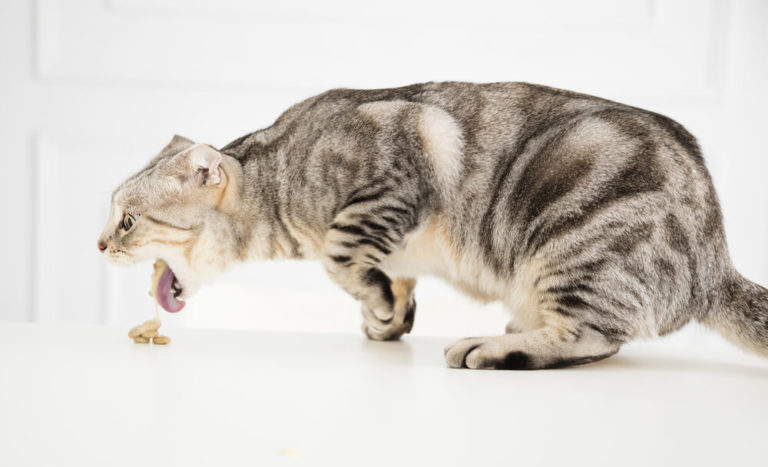Seeing your cat foaming at the mouth or throwing up white foam can be horrifying. We all love our furry felines, so it’s terrible to see them ill. So, why is your cat foaming at the mouth?
Cats can foam at the mouth for various reasons, including rabies, dental disease, nausea, and poisoning. If it seems like your cat is foaming at the mouth, it could signify a severe health problem. Therefore, it’s essential to take them to the vet immediately to get a diagnosis and treatment.
It’s essential that know why your cat is foaming at the mouth and take quick action to ensure your feline does not get any worse.
Why Do Cats Foam At The Mouth?
Your cat can be foaming at the mouth for many reasons. It could be due to anxiety, poisoning, nausea, dental issues, seizures, or rabies.
1. Your Cat Is Anxious
Anxiety may be the cause of your cat foaming at the mouth. Emotional distress can cause hypersalivation, leading to white foam in your cat’s mouth. You need to determine the reason for your cat’s anxiety. Did you move to a new place? Is it possible your cat has separation anxiety? Your cat may have had a scary experience with another animal or a human.
2. Your Cat Was Poisoned
A cat may start foaming at the mouth if he has been poisoned. If you have given your cat medication lately, perhaps you administered it incorrectly. For example, flea drops – your cat may have licked it off. Your cat may also have ingested harmful household substances such as bleach or soap.
3. Your Cat Is Nauseous
The reason for your cat foaming at the mouth may be nausea, which could be the symptom of an underlying condition. Pregnancy, motion sickness, gastritis, or diabetes could also be the reason.
4. Your Cat Has Dental Issues
A dental problem, like an infection, could be causing your cat to foam at the mouth. Gingivitis or a broken tooth could be the cause of the infection. Foaming at the mouth is usually accompanied by pain, appetite loss, and bad breath.
5. Your Cat Is Having A Seizure
Seizures caused by a neurological disorder could cause foaming of the mouth. For example, if your cat has a seizure, foaming at the mouth will usually be accompanied by loss of consciousness, shaking, and collapsing on the floor.
6. Your Cat Has Rabies
The thought of your cat having rabies is a terrifying experience. But unfortunately, foaming at the mouth can be a symptom of rabies. Rabies is a viral disease that affects the brain and the nervous system. It is usually accompanied by muscle control loss, aggression, and drooling.
Sadly, foaming at the mouth is often the last stage of rabies, and your vet may need to euthanize your cat. However, vaccinating your cat yearly against rabies can prevent it from getting that bad.
What Should You Do If Your Cat Is Foaming At The Mouth?
If it seems like your cat is foaming at the mouth, you must take him to the vet. The reason is to rule out any serious issues like seizures or rabies. Likewise, if your cat has anxiety, you should investigate the trigger. There are also some medications that a vet can prescribe for anxiety.
If you suspect your cat has been poisoned, take your cat to the vet as soon as possible. Luckily, your vet can help if you take your cat promptly. If your cat is nauseous, there may be an underlying condition, and you must take your cat to the vet to investigate the cause.
As mentioned before, dental issues can cause foaming at the mouth. To minimize the risk of dental issues, brush your cat’s teeth to prevent oral infections. Alternatively, you can visit a vet. If it seems your cat is having a seizure, you should need immediate vet care. Luckily, some medications can treat seizures in cats.
If you suspect your cat has rabies, foaming at the mouth is usually the last symptom, and there will be nothing you can do to treat this disease. Sadly, your cat may need to be euthanized at the vet. However, vaccines are crucial and can severely prevent your cat from getting this disease.
It’s essential to see the vet if your cat is foaming at the mouth and you have no idea what is causing it.
Is Your Cat Vomiting White Foam?

If it seems like your cat is coughing up white foam, there may be many reasons for this, which includes:
- You can address this by feeding your cat small, frequent meals. An inconsistent feeding schedule usually causes indigestion.
- Irritable Bowel Syndrome. IBS is usually accompanied by diarrhea. Your vet will do some tests to determine a treatment plan.
- Because cats groom themselves, they are prone to getting hairballs. To address this issue, you can get dietary supplements for your cat and brush your cat regularly.
- Your cat may have eaten something that they shouldn’t have. Other symptoms include vomiting bile or blood and lethargy. Your vet will prescribe the appropriate medication.
- Pancreatitis can be acute or chronic; a vet treats it through fluid therapy and medication. Other symptoms include fever, appetite loss, dehydration, weight loss, and pain in the belly area.
- If you have not dewormed your kitten, he might have parasites. For example, vomiting white foam is usually accompanied by diarrhea.
- Hyperthyroidism is common in older cats, and other symptoms include weight loss, diarrhea, and an increase in urination. Your vet will run tests and prescribe daily medication.
- Chronic kidney disease. Renal insufficiency is common in older cats. Vets cannot cure it, but A vet can treat the symptoms. Other symptoms include dehydration, weakness, increased drinking, loss of appetite, and change in urine.
- Your vet will start your cat on insulin therapy or similar treatment if diagnosed with diabetes. Other symptoms include increased urination and excessive drinking.
Your veterinarian can determine what is ailing your cat. If your cat is regularly coughing up or vomiting white foam, it’s best to take her to the vet to ensure your feline friend has no illnesses.
Final Verdict
Don’t expect the worst if your cat is foaming at the mouth. If you have vaccinated your cat against rabies, there may be another reason for your cat doing this. Taking your cat to the veterinarian immediately is essential to rule out any serious illnesses. Likewise, if your cat frequently vomits white foam, take him to the vet.
Frequently Asked Questions
Q: What does it mean if a cat’s mouth is foaming?
A: A cat’s mouth may foam for a number of reasons, including vomiting, allergies, and reactions to medication. If your cat is foaming at the mouth, it is important to seek veterinary care to determine the cause and get appropriate treatment.
Q: What should I do if my cat is foaming at the mouth?
A: If your cat is foaming at the mouth, you should seek veterinary care immediately. Your vet will be able to determine the cause of the problem and provide appropriate treatment.
Q: Why is my cat foaming at the mouth after flea treatment?
A: Some flea treatments can cause an allergic reaction in cats, resulting in foaming at the mouth. If your cat is having this reaction, you should seek veterinary care and stop using the flea treatment.
Q: Why is my cat drooling and foaming at the mouth?
A: A cat may drool and foam at the mouth if it has a condition called ptyalism, which causes excessive saliva production. Ptyalism can be caused by a foreign body in the mouth, an infection, or a reaction to medication. If your cat is drooling and foaming at the mouth, you should seek veterinary care to determine the cause and get appropriate treatment.
Q: Why is my cat foaming at the mouth after taking Benadryl?
A: Benadryl can cause side effects in some cats, including foaming at the mouth. If your cat is taking Benadryl and experiencing this side effect, you should seek veterinary care.
Q: Why is my cat foaming at the mouth after medication?
A: Some medications can cause side effects in cats, including foaming at the mouth. If your cat is taking medication and experiencing this side effect, you should seek veterinary care.
Q: Why is my cat foaming at the mouth in car?
A: Cats can sometimes foam at the mouth when they are anxious or stressed, such as during a car ride. If your cat is foaming at the mouth while in the car, you can try to calm it down with soothing words and petting. If the problem persists, you should seek veterinary care.
Q: Why is my cat foaming at the mouth and twitching?
A: A cat may foam at the mouth and twitch if it has a condition called ptyalism, which causes excessive saliva production. Ptyalism can be caused by a foreign body in the mouth, an infection, or a reaction to medication. If your cat is drooling and foaming at the mouth, you should seek veterinary care to determine the cause and get appropriate treatment.
Q: Why is my cat foaming at the mouth with blood?
A: A cat may foam at the mouth and have bloody saliva if it has a condition called ptyalism, which causes excessive saliva production. Ptyalism can be caused by a foreign body in the mouth, an infection, or a reaction to medication. If your cat is drooling and foaming at the mouth, you should seek veterinary care to determine the cause and get appropriate treatment.
Q: Why is my cat foaming at the mouth after catnip?
A: Some cats may foam at the mouth after exposure to catnip. This is not usually a cause for concern, but if you are worried about your cat’s reaction, you can consult with your veterinarian.
Additional Sources & Resources
1) “Foaming at the Mouth in Cats.” VCA Hospitals, www.vcahospitals.com/main/pet-health-information/article/animal-health/foaming-at-the-mouth-in-cats/.
2) Goldstein, Rebecca L., et al. “Mouth Foaming in Cats.” Just Right Pet RX, 25 Apr. 2016, justrightpetrx.com/mouth-foaming-cats/.
3) Sansone, Sharon A., and Nancy L. Downing. “Cat Drooling.” The Merck Veterinary Manual, Merck Sharp & Dohme Corp, 1 Aug. 2017, www.merckvetmanual.com/generalized-conditions/symptoms-and-signs/drooling-in-cats.
4) “Why Is My Cat Drooling?” American Society for the Prevention of Cruelty to Animals, www.aspca.org/pet-care/cat-care/common-cat-behavior-issues/why-my-cat-drooling.
5) “Foaming at the Mouth.” WebMD, www.webmd.com/first-aid/tc/foaming-at-the-mouth-topic-overview.



